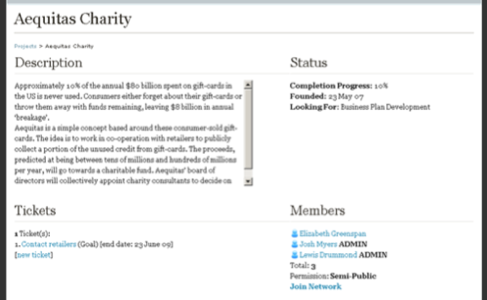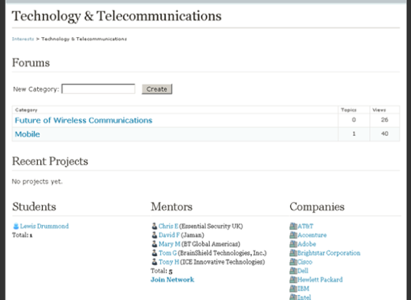No ambitious young person wants to wait until graduation to start working on projects, developing ideas, and building teams. As a case in point, consider how many success stories from the dotcom and Web 2.0 eras have begun with brilliant twenty-somethings dropping out of college to pursue their passions.

Speaking directly to this concern (or phenomenon, depending on your perspective), two students at the New York University Stern School of Business and a former MySpace IT director have started FledgeWing, a new social network that aims to connect aspiring student entrepreneurs with one another as well as with mentors, investors, and industry professionals.
On the network, articles, events, jobs, schools, companies, and student organizations are indexed; would-be entrepreneurs are given opportunities to present their projects, find mentors, and submit case studies.
Students present brief descriptions of their projects along with goals and objectives; the UI acts as a light project management, task-tracking app. Others may leave comments or request to join the project.

The case studies are presented as business challenges within the tech/social media world and range from the creation of a retail outlet for Microsoft to the development of a business model for Twitter. Students are encouraged to submit their case studies as comments, attaching any necessary documents to validate or clarify their POV.
The site also has been categorized by areas of interest; and different forums, students, mentors, and companies appear in each category.

Co-founder Lewis Drummond said his team is “bringing together the brightest and most creative minds during a time when then entire structure of business is changing.
“The site has a large database of mentors, companies, and jobs… FledgeWing also regularly hosts all-expenses paid networking events… along with business plan competitions with cash prizes. Entrepreneurial clubs can participate in and host forums, while a feedback-style rating system and comprehensive intellectual property agreement ensure quality control and legal protection for both users and club moderators. Additionally, clubs can create events and have a place for users to collaborate together on specific projects.”
In addition to bridging the gap between professional and student entrepreneurialism, the site also intends to encourage more cooperation and collaboration between student entrepreneurs and supporting organizations at different universities.
We find the heavy emphasis on business (as opposed to straight tech) an interesting and valuable approach to the aforementioned structural changes going on in our industries. As we noted in a previous article on IT and journalism student collaboration, bringing different disciplines together with an emphasis on pragmatic creation and measurable action is sure to yield mutually beneficial results for all involved. In this case, from perusing the student projects and comments, we notice a trend toward bootstrappable startups – a welcome mindset in the current economy.
Fledgewing also represents a trend we’ve noticed toward project-driven social-professional networks that focus on active collaboration and partnership. IBM has recently launched two such sites, one for developers and one for business partners.
What do you think: Is this breed of social-political online groups a valuable networking tool that can lead to successful projects in reality? And is interdisciplinary collaboration the best route to better, more viable startups? Let us know your thoughts in the comments.





















